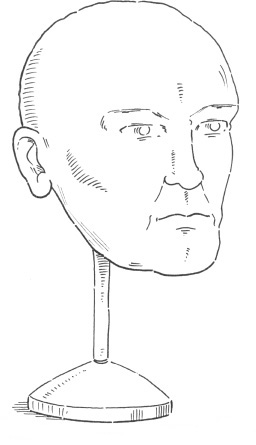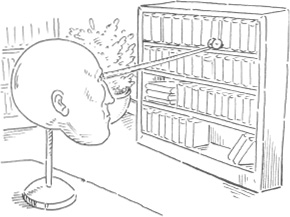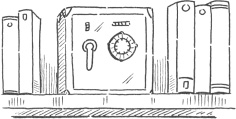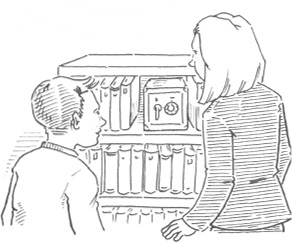Iced!: The 2007 Journal of Nick Fitzmorgan (5 page)
Read Iced!: The 2007 Journal of Nick Fitzmorgan Online
Authors: Bill Doyle
And found Maura, the pilot, looking at me with that same stony expression.
“Hey!” I shouted. “What are you doing creeping around my house?”
“You left the front door open.”
I felt myself flush. She was right. I had made a stupid mistake, especially since I had just come back from three weeks of
detective training. “What? Do you go around tripping everyone who leaves a door open?” I demanded.
She calmly crossed her arms. “Judge Pinkerton told me to return and said that there might be trouble. I wasn’t sure who you
were or if you might be armed. I’m here to take charge of the situation.”

MAURA PLANNED TO “TAKE CHARGE”!
“If by ‘take charge’ you mean ‘stay out of my way so I can find my dad,’ then sure, I guess that would work.”
“Whatever you say,” she said coolly.
“Come on,” I retorted. “I have to get back to work.”

THE RECONSTRUCTED FACE LOOKED FAMILIAR—BUT WHY?
7:30 PM
For the next three hours, I worked on
reconstructing the face over the skull. Maura had made a sweep through the house—checking to make sure that there were no
intruders or a ransom note that I had missed. But, like me, she had come up empty–handed. There were no concrete clues as
to what had happened to my dad.
Now she was perched on the edge of Dad’s desk, watching me work. “I think you might be wasting your time. Your dad’s probably
just at the store or the movies,” Maura said. “He wasn’t expecting you to be home for another week. Maybe he went out of town.”
“I hope so,” I said, gently pushing a piece of clay onto the skull. “But Judge spoke with him this morning. She told him I’d
be home today.”
Finally, the head was done. I took a step back and looked at my work: It was a man. And he had a face that looked familiar
to me.
“Does this look like anyone you know?” I asked Maura. “Or knew?”
She stood and moved closer to examine the head. “I can’t put my finger on it,” Maura said thoughtfully, “but his face is ringing
a bell.”
I nodded in agreement. Bells were definitely ringing. But who was he?
I grabbed my digital camera, snapped a quick pic, and downloaded it to my computer.
“What are you doing?” Maura asked.
“My dad got us this cool facial recognition software,” I told her. “You just put in a photograph of someone’s face. The program
looks at skin texture and facial characteristics, like the distance between the eye sockets or the point of a nose. Then it
tries to match the face you put in to others in the database. It’s not as good as a fingerprint. But since the skull is all
we have to work with …”
“I didn’t think there was a central database with everyone’s faces” Maura observed.
“There isn’t,” I agreed. “So I just told my computer to check with the different databases around the world that do—including
those in museums. It’s going to take a while to go through all those photos.”
JUST THE FACTS
In the early 1990s, researchers developed EIGENFACES, a facial recognition program that zeroes in on 128 different points on a person’s face (from photos, video, or sketches). It compares those points to other people’s faces and looks for a match.
The United States Marshals Service recently used the Illinois facial reconstruction database to track down info on one of their 15 Most Wanted fugitives. After entering the booking photo of Daniel Escobedo, the system scanned over eight million driver’s license images in the database. The man’s license popped up first within seconds.
I USE A VERSION OF THIS SOFTWARE
With my computer working away, I examined the face again. “How do I know you?” I asked it.
In a flash, something popped into my head. “My dad always says, ‘Nick, you can tell a lot about a person by where they look
when you’re talking to them.”
Maura looked at her watch, as if she wasn’t sure how long she’d have to be here. “That’s a nice saying.” Her tone was one
you would use with a little kid.
“How about the mystery wan?” I wondered out loud. “Where is he looking?”
I grabbed a tape measure. I hooked one end to the top of the face and extended the tape, following the face’s gaze across
the room as if it were a straight arrow. The face’s line of “vision” traveled over the mess on the floor to the bookshelf.

On a whim, I removed one of the books from the general area in which the skull was looking. It was a book about trains in
1906. I flipped quickly through the pages and then gave the book a shake. No secret note fell out. I took another book down
from the same area and got the same results. Nothing.
I was just turning away from the bookshelf, when something caught my eye.
BAM!
The polished metal corner of some kind of door shone through the space I had made in the bookshelf. There was something hidden
behind the other volumes. Maura noticed it, too. Together, we removed the rest of the books from that shelf.

Soon we were looking at the door of a hidden safe.
My heartbeat kicked up a notch.
“You didn’t know this safe was back there?” Maura asked.
I shook my head. “Dad must have known that I would put the skull in the same place I always do—and that when I reconstructed
the face, it would be looking at this spot!”
I yanked on the safe door, but it wouldn’t budge. It was locked tight. I looked more closely—the safe had a small microphone.
SPY SHOP
Congratulations on your purchase of the Sez-U 2200 Safe! Key locks have been replaced by biometrics. The safe will only open for people with authorized “voiceprints” and the correct password. Why is this better? You can forget your keys—but you can’t forget your voice!
THIS IS THE SAFE MY DAD BOUGHT
Oh, no, I thought. That meant it had a voice recognition lock.
There were tons of biometric systems in our house—like the locks on the doors, the lights, and even the TV remote. The systems
were able to read different human characteristics, like the shape of the face, fingerprints, and voice patterns. For example,
if you didn’t have the right retina, the front door wouldn’t unlock for you.
“My dad set all the biometrics systems in the house to accept voice commands from him and me,” I told Maura. “But this safe
is different. To open it, you not only need the right voice—which I have—but also the correct password—which I don’t have.”
Maura tapped a finger against her lips, clearly trying to think of a way into the safe. I was glad she didn’t suggest that
I just “safecrack” it.
TALK ABOUT WORKING UNDER PRESSURE…
Safecracking Down Under
In the early twentieth century, Charles Courtney had two loves: mechanical things (especially locks) and undersea diving. He decided to combine his two loves and went to work as a safecracker on sunken ships. The first person to crack a safe 400 feet underwater, he recovered millions of dollars during his career!
Thanks to Hollywood, lots of people think it’s easy for a detective or a safecracker to unlock a safe. But most safecrackers
don’t use stethoscopes to listen to clicking lock tumblers like in the movies. That would take much too long and might not
even lead to success. Instead, they drill through the casing, smash the safe open, or just blow the door off.
I didn’t have the equipment for any of that. I started trying passwords. “Unlock,” I said. The safe made a harsh BUZZ! Sound
and stayed locked. I had guessed wrong.
Hmmm … any good investigator knows that most people use their birthdays or names of relatives as passwords. I tried my dad’s
birthday and then my own, and the safe buzzed twice. I spoke my name “Nick”—BUZZ!—and my dad’s “Henry”—BUZZ!
Maura calmly raised an eyebrow, as if to say, What are you doing?
For some reason, her calm only frustrated me more and I yelled, “I don’t know!”
BUZZ!
Suddenly, a woman’s pleasant voice came from the safe. “Due to six unsuccessful password attempts, security measure 865 is
now in place. If you fail twice more, the contents of the safe will be destroyed to protect them from wrongful possession.”
I forced my mouth closed. I had been about to make another guess at the password—but now every guess counted.

I ONLY HAD TWO MORE CHANCES TO FIGURE OUT THE PASSWORD!
I gestured for Maura to follow me away from the safe, so that it wouldn’t overhear our conversation and think that we were
trying out passwords.
“I need you to help me brainstorm,” I said to her when we were huddled in the corner.
“Okay,” she said, her eyes focused intently on me. “You’ve tried all the types of words I would have tried. I have the feeling
that it is something only you would know. Has your father said anything to you lately that was only between the two of you?”
My mind started working. Dad and I shared a lot of stuff, but I couldn’t think of anything that could be boiled down into
a password. I shook my head.
But Maura wasn’t giving up. “So he hasn’t said anything to you lately that struck you as a little strange?”
“No,” I answered. “But someone else has.”
I reminded Maura that the strange guy at the door had uttered some kind of nutty phrase before running off.